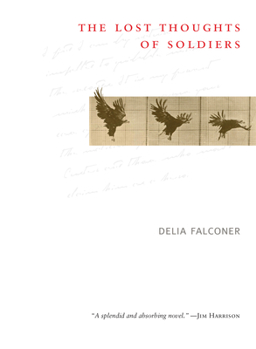The Lost Thoughts of Soldiers
Select Format
Select Condition 
Book Overview
Georgia, 1898: On what may be the last day of his life, Captain Frederick Benteen -- the man who saved Custer's Seventh Cavalry from almost certain death at Little Bighorn -- receives a letter from an ambitious boy offering to "restore" his reputation. For over 23 years Benteen has silently watched Custer's legend grow. His General has been dead for more than 20 years, killed in action, considered a hero, while the public has never forgiven Benteen...
Format:Paperback
Language:English
ISBN:1582435286
ISBN13:9781582435282
Release Date:October 2009
Publisher:Counterpoint LLC
Length:144 Pages
Weight:0.32 lbs.
Dimensions:0.5" x 6.2" x 7.5"
Customer Reviews
3 ratings
The perfect title for this endearing book
Published by Thriftbooks.com User , 15 years ago
It's a strange thing to call a book of this type and subject matter mesmerising, but that is it's effect - at least it was for me. Falconer's writing is lush, poetical, graceful (add superlative here) and practically perfect for this collection of the seemingly random thoughts of an aged ex-soldier. Yet it remains real, coarse language and all. This book does not focus on the battles of war, but rather on the personalities, relationships and thoughts of these ordinary soldiers at rest (and play), rendering them human and real through the remembering of Benteen. Beautiful, funny and very endearing.
"It is a myth we prove ourselves in war, he thinks: we test ourselves in silence."
Published by Thriftbooks.com User , 18 years ago
More than twenty years after the end of the Civil War, Custer is a hero while Captain Frederick Benteen - the man who infamously saved the remnants of the Seventh Cavalry at Little Bighorn - has never been forgiven for presumably disobeying orders and thereby surviving. Now Benteen receives a letter from an ambitious youth offering to restore his reputation by telling the "true story" of what happened. As Benteen ponders the possibility one morning at home, he's drawn back into the past and an exploration of his life and self ... "He moves indirectly" are the first words of this novel. They physically describe the central character, Benteen, but they're also an apt announcement of Falconer's narrative choice. She follows the pattern of memory, moving in and out of her character's past in short fragments, exploring connections that might not seem initially obvious but which are, in the end, the only stuff of which our mental lives and identities are actually composed. This is one of those rare novels in which the author's poetic choices are entirely appropriate to the type of story she wants to tell. Indeed, this is a work of immense precision. The language is nothing less than exquisite; the novel is a collection of beautiful miniatures that keep you engrossed despite the absence of immediately discernable plot. I suspect, however, that this beautiful novel is destined to be ignored by Civil War scholars or dismissed with slight bemusement. But they'll miss out on something wonderful by holding it to a goal it doesn't set out to achieve: despite its reasonable adherence to historical facts (creative departures from which Falconer happily acknowledges), this isn't an attempt at biography or historical "truth" in any factual sense, whatever that might mean in these postmodern times. Falconer is more interested in exploring larger issues of memory, celebrity and identity, and uses the Civil War as a ready context. The point is entirely transportable to any mythologized conflict, or indeed to any sphere in which public myth eclipses and ultimately effaces the private lives and memories of actual human beings: "This is history too, he thinks, the weight of gathered thoughts, the cumulus of idle moments." My only reservation is on one aspect of style. Many of the short sections surprise, at their end, with an unexpected moment of violence, overt sexuality or scatological humour. The technique is wonderfully effective when used sparingly. However, by my count it's used more than 30 times in 140 pages - that tends to dilute its force.
The Lost Thoughts of Soldiers
Published by Thriftbooks.com User , 18 years ago
Short, intense, incandescent, brooding, mysterious and brilliant. Falconer had given us a heavy meditation on the true value of life and mtyh, the enduring power of love and the equations that govern destiny. The story of Frederick W. Benteen, survior (peerhaps by proxy) of the Battle of Little Bighorn and his struggle to honour, in his own mind and to that of a public craving myth, the memory of those who died - both of the 7th Cavalry and the Indians whom they pursued and slaughtered is slow, at time lugubrious, but frequently leavened with a rough humour which contrasts with Falconer's flightly, elliptical and highly poetic story-telling - yet still it is perfectly rounded and timeless to read - ending where, and on the note which, it should But this is more than story telling. Like the "Service of Clouds" this is a book you let wash over you, you let enchant you, you let transport you to the crepuscular dimness of the final corners of a obtuse and oblique man's life. This slim book is and is of a world unto itself. Falconer is a wonderful, wonderful writer. "The Service of Clouds" is the best book I have read in the last ten years, and "The Lost Thoughts of Soldiers" is a worthy and powerful work which, even in the mighty shadow of her previous book, did not disappoint me. In fact, it filled me up.






